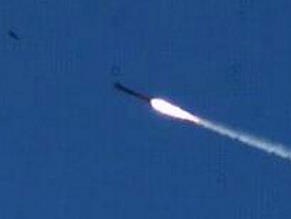|
World Jewish News

Shown in this photo, a rocket fired from the 'Iron Dome' system during a test in southern Israel. Defense Ministry/AP
|
Iron Dome system deployed in south, but might not stay
28.03.2011, Israel The army deployed its Iron Dome anti-missile defense system for the first time yesterday, temporarily positioning one battery north of Be'er Sheva just as the Negev had its first day free of rocket or mortar fire in more than a week.
The Israel Defense Forces is planning on keeping its two anti-missile batteries mobile for now, leaving open the possibility of stationing them on the northern border as well as in the south. The decision comes despite pressure from leaders of Israeli communities near Gaza to deploy the batteries in the Western Negev on a permanent basis.
Military officials attribute the quiet to Hamas' interest in preventing further escalation and the pressure it exerted on Islamic Jihad to refrain from firing rockets and mortars on southern Israel, more than 100 of which hit the Negev in the past 10 days.
The area was not altogether quiet yesterday, though. The Israel Air Force attacked an Islamic Jihad rocket-launching cell in Jabalya yesterday morning. Palestinian sources said two militants were killed and two were wounded.
Israel doesn't want to escalate the situation on the Gaza border, Defense Minister Ehud Barak told the cabinet yesterday.
"We have no interest in escalating the events, and it's important to maintain a normal routine," he said. "The terror organizations in Gaza have sustained serious blows" in the past 10 days, including the deaths of 13 terrorists and damage to terror infrastructure, he said.
Barak, who gave the authorization to deploy the Iron Dome battery yesterday, said the army would decide where to place the anti-missile batteries based on "operational and professional considerations."
"It's not a 100 percent solution, but it will gradually improve the defense situation," he said. "The IDF will be equipped with additional systems in the future. This process requires not insignificant resources and will continue for several years."
The Israel Air Force said the battery deployment begun yesterday was an operational trial and that the defense system would not be able to intercept missiles for another few days.
"This is the last phase of the operational trial, and in the coming weeks we will go to several sites in the country to examine the system's operational readiness," said Brig. Gen. Doron Gavish, who commands the IAF's air defense system.
One Iron Dome battery is expected to extend a defense umbrella over an area the size of a medium-sized city, and the second will be deployed as needed.
After the battery is moved to different areas of the south as part of the testing process, one anti-missile battery will be deployed to various sites on the northern border, the IAF said. The second will apparently be kept at an IAF base in the south, to allow for continued training of the soldiers who will be operating it.
The rocket-battered city of Sderot will not be one of the sites to get Iron Dome protection, at least in the short term, because the army considers the homes there to be sufficiently reinforced.
Victim for years
Members of the Knesset Foreign Affairs and Defense Committee visited Be'er Sheva yesterday to meet with local Negev leaders and hear their views on the security situation in the south.
Sderot Mayor David Buskila said everyone in the area, not just residents of bigger cities like Be'er Sheva, needs greater protection.
"They decided to place the battery in Be'er Sheva in order to keep everyone quiet," he said. "We all need it but there aren't enough batteries. We were a victim for years. The IDF won't embark on a Cast Lead because of Sderot and the communities bordering Gaza, though, but because of Be'er Sheva and Ashdod."
By Yanir Yagna and Anshel Pfeffer
Haaretz.com
|
|
